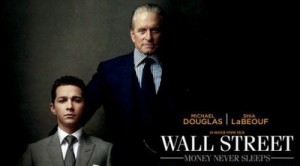“Someone reminded me I once said, ‘greed is good.’ Now it seems it’s legal.”
That’s one of the snappiest lines from Oliver Stone’s “Wall Street: Money Never Sleeps,” but strangely enough, it also encapsulates the film’s biggest flaw. When Gordon Gekko (Michael Douglas) introduced the immortal “Greed is Good” mentality in 1987’s “Wall Street,” that slimy bravado actually had a shocking element to it. Meanwhile, his updated statement, clever as it may be, is anything but shocking; in fact, it’s basically unneeded.
“Money Never Sleeps” is an opportunistic device to connect Gekko’s ’80s archetype for brash dishonesty to our current economic meltdown. But seeing how “Wall Street” has long been regarded as a lasting document of corporate decadence, this is a wholly unnecessary redux that goes through the same exact motions in a different setting — it seems “told you so” is the most pervasive statement this film has to offer.
Gordon Gekko, released from an eight year prison sentence in 2001 before the narrative jumps another seven years, is basically a sideshow in a convoluted, barely fictionalized rendition of the 2008 recession. The real center of attention is a young and idealistic Wall Street broker, Jacob Moore (Shia LeBeouf, actually very good at balancing confidence and naivete). He wants to fund a breakthrough in alternative energy and also to marry his girlfriend Winnie (Carey Mulligan), who runs a budding liberal news website. There is no way things will actually be that simple, of course. The firm he works for, Keller Zabel, is quickly being destroyed by a vastly more powerful company, Goldman Sachs … er, “Churchill Schwarz.” His well-meaning mentor Lewis (Frank Langella) is bullied and broken by Churchill Schwarz’s scumbag CEO, Bretton James (Josh Brolin), and Jacob wants revenge. And Winnie, by the way, is Gordon Gekko’s daughter — she wants nothing to do with him, what with the inside trading bust and all, but Gordon secretly takes Jacob under his wing as a protégé, for better or worse.
Michael Douglas does a great job sinking back into his iconic character, but he’s sadly stilted by the estranged daughter plot line, which pushes too hard for us to believe that Gordon Gekko is still just as menacing but also reformed and worthy of sympathy. But that’s merely bad drama, which the first “Wall Street” wasn’t exactly devoid of either. The bigger problem is that the film isn’t driven by any rage or indignation — in the alternate reality of “Money Never Sleeps,” our economic crisis is regarded like business-as-usual fodder for any ol’ corporate melodrama. The story is told in a flashy, entertaining style, and it even does well in conjuring the dread that surrounded the 2008 crash. But when it comes to actually taking the guilty parties to task, the film does little more than simply put the greedy guys on display. And the happy resolution that’s given to the whole thing doesn’t just feel odd, it feels disingenuous.
Oliver Stone was once at master at chronicling American mindsets, as when he perfectly invoked the conspiracy theorist paranoia of the ’60s in “JFK” or the post-Vietnam sense of national betrayal in “Born on the Fourth of July.” But after putting a too-happy-too-soon face on 9/11 in “World Trade Center” and reducing George W. Bush’s presidency to cut-and-dry psychobabble in “W.,” “Money Never Sleeps” really makes the case that Stone is either too timid or too disconnected from modern times to get incensed again. Hell, what do you expect when he keeps prioritizing breaking news over investigative reporting.
Grade: C+



